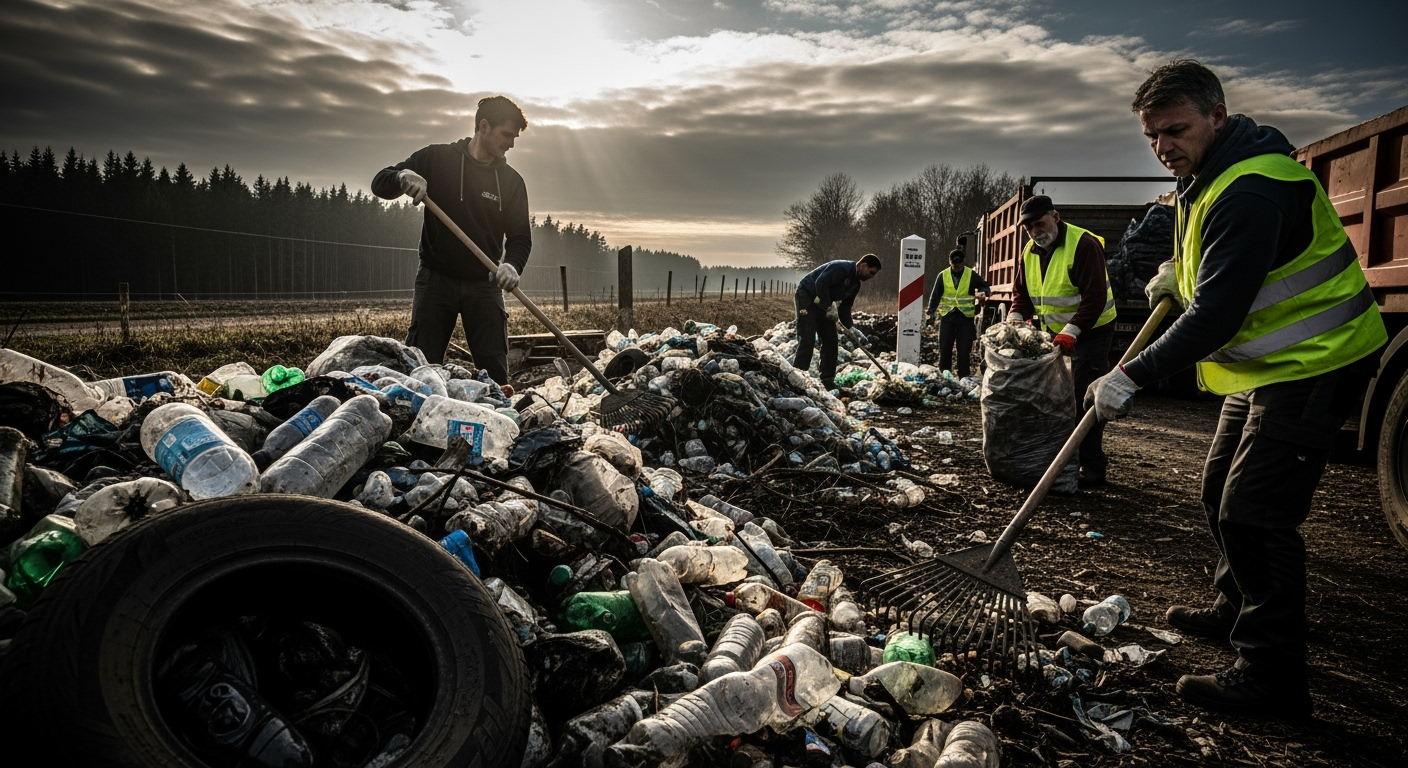Related Articles

The Unseen Costs: Dissecting the Dark Side of Viral Food Trends

Solar's Bold Horizon: Powering Earth and Beyond in a New Energy Era





JIRIKOV, Czech Republic – A significant international effort is underway as German authorities have begun repatriating hundreds of tons of illegally dumped hazardous waste from the Czech Republic, a stark reminder of the escalating problem of environmental crime across European borders. The cleanup, primarily centered in the small Czech municipality of Jirikov, addresses waste falsely labeled as recyclable materials, including fiberglass from wind turbine blades, shredded hard drives, and car batteries, which pose a serious threat to the local environment and public health. The incident highlights a broader trend of illicit waste trafficking, prompting calls for more robust cross-border cooperation and enforcement.
The discovery of the illegal dumps in Jirikov unfolded dramatically in December of the previous year. Trucks, dispatched by a German company, began offloading substantial quantities of mixed waste. Mayor Barbora Siskova of Jirikov became instrumental in uncovering the illicit operation after noticing inconsistencies in documents presented by a Czech man who claimed to be setting up a plastic recycling plant. He had temporarily stored materials in the open at a former sawmill site. Ms. Siskova observed that the waste, touted as pure plastic for recycling, clearly contained hazardous components like fiberglass, which is notoriously difficult to recycle. Her vigilance prevented further illegal deliveries, as she successfully turned back additional trucks weeks after the initial dump.
Following Ms. Siskova's intervention, Czech police and customs officers launched an investigation, revealing that the waste was not isolated to Jirikov. Other illegal dump sites were subsequently discovered in municipalities such as Horni Herspice, near Brno. German authorities, collaborating with their Czech counterparts, have since detained the CEO of a Bavarian waste management company, identified as ROTH International, and a Czech truck driver. They are under investigation for allegedly orchestrating at least 21 illegal cross-border waste shipments since 2022, deliberately mislabeling hazardous materials to circumvent strict disposal regulations. The German company has reportedly gone bankrupt, adding a layer of complexity to the remediation efforts and shifting the financial burden.
After months of negotiation and delay caused by the bankruptcy of the responsible German firm, the large-scale cleanup operation finally commenced. The Free State of Bavaria, acting under an order from the Upper Palatinate government, committed to funding and executing the repatriation of the approximately 500 tons of waste from both Jirikov and Horni Herspice back to Germany. In early September, the first loads, totaling around 170 tons, began their journey back across the border. The waste, including roughly 260 tons of glass fiber and carbon fiber reinforced plastic from items such as wind turbine rotor blades, is being transported to a facility in Thuringia and a central site in Hof/Oberfranken in Bavaria for sorting and proper processing. Czech Environment Minister Petr Hladik publicly acknowledged Bavarian officials for their cooperation in resolving the situation, emphasizing the importance of swift action. The removal process in Jirikov was projected to be completed within weeks, with the broader repatriation taking up to ten weeks.
The illegal dumping has raised serious environmental concerns. Initial analyses conducted by the Czech environmental organization Arnika in March revealed the presence of various toxins, including pesticides and per- and polyfluoroalkyl substances (PFAS), commonly known as "forever chemicals," both within the dumped materials and the surrounding soil. This contamination suggests that hazardous substances have already leached into the environment, posing a potential threat to groundwater and local ecosystems. Once the physical removal of the waste is complete, further soil and water samples will be taken in Jirikov to fully assess the extent of the environmental damage.
This incident is not an isolated case but rather symptomatic of a wider, lucrative criminal enterprise thriving across Europe. Experts indicate that stricter waste import regulations in Asian countries have led to a diversion of illegal waste streams back into Europe, with countries like Poland, Slovakia, Romania, Bulgaria, and Croatia also becoming hotspots for illicit dumping. The practice often involves mislabeling waste, exploiting loopholes, and targeting countries with comparatively lower landfill fees or weaker enforcement. The illicit accumulation and mismanagement of waste consume vast resources for remediation while simultaneously endangering wildlife and public health.
The recurring nature of cross-border waste dumping between Germany and the Czech Republic underscores a persistent challenge. Historically, instances of German waste being illegally imported into Czech border regions date back at least to 2006, sometimes involving attempts to burn the waste to destroy evidence. Czech officials have long highlighted the problem, noting that it is often cheaper for German companies to illegally dispose of waste abroad than to process it domestically.
In response to the current crisis and the broader pan-European issue, Czech politicians, including Environment Minister Petr Hladik, are advocating for stronger measures at the European Union level. The Czech Environment Ministry emphasizes that illegal waste shipments constitute a serious form of environmental crime driven by economic incentives, calling for enhanced cooperation. The EU's Anti-Fraud Office (OLAF) has recently launched a Waste Shipment Enforcement Group, a new initiative aimed at strengthening cross-border tracking and enforcement, with plans for digital documentation to be rolled out next year.
The ongoing cleanup in Jirikov serves as a potent reminder of the critical need for vigilance, stringent regulation, and robust international cooperation to combat environmental crime. While the immediate removal of hazardous waste from Czech soil is a positive step, the long-term environmental consequences and the systemic issues enabling such illicit activities demand sustained attention. The collaboration between German and Czech authorities, spurred by determined local officials, offers a blueprint for addressing these challenges. However, without a harmonized and aggressively enforced European strategy, the specter of illegally dumped waste will continue to cast a shadow over environmental protection efforts across the continent, leaving both nature and taxpayers to bear the ultimate cost.